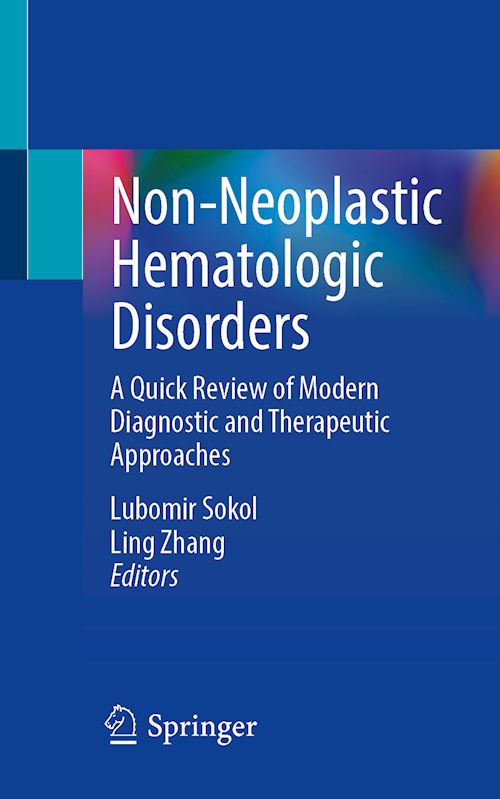

Questo prodotto usufruisce delle SPEDIZIONI GRATIS
selezionando l'opzione Corriere Veloce in fase di ordine.
Pagabile anche con Carta della cultura giovani e del merito, 18App Bonus Cultura e Carta del Docente
In the current digital era with the exponential growth of medical knowledge, voluminous textbooks have gradually been replaced by the pocketbooks with tables, figures, images, and e-links to digital book versions with supplemental materials available online. The advent of novel next-generation sequencing (NGS) and multi-omics single cell methods have uncovered causative molecular mechanisms in most of the known non-neoplastic hematologic disorders. There is an urgent need for a concise and up-to-date handbook focused on non-malignant hematology.
The book describes characteristic clinical features and state-of-the-art diagnostic approaches of non-neoplastic hematologic disorders. It introduces modern molecular biomarkers with enormous diagnostic and prognostic value and novel targeted gene therapy. Differential diagnosis also includes relevant hematologic malignancies that could represent diagnostic pitfalls. Chapters include take home points for each disorder in concise and easy memorable manner. The book also provides diagnostic algorithms, novel prognostic and predictive factors, up-to-date treatment options, clinically relevant molecular signatures, and ongoing promising clinical trials if available. There are more than 100 questions and answers with comments on laboratory values, updated cytogenetic and mutational profiles.
Non-Neoplastic Hematologic Disorders: A Quick Review of Modern Diagnostic and Therapeutic Approaches provides concise clinical and laboratory information about most common non-neoplastic hematologic disorder for practicing hematologists, oncologists, hematopathologists, molecular pathologists, internal medicine specialists, pediatricians, research nurses, nurse practitioners, and trainees at all levels.
Benign Neutrophilic Disorders.- Benign Eosinophil Disorders.- Benign Monocytic Disorders.- Benign Basophil and Mast Cell Disorders.- Benign Lymphocytic Disorders.- Primary and Secondary Immunodeficiency.- Benign Histiocytic and Dendritic Cell Disorders.- Iron Deficiency Anemia.- Anemia of Inflammation.- Megaloblastic anemia.- Sideroblastic anemia.- Hemoglobin disorders.- Red blood cell enzymopathies.- Red Blood Cell Membrane Disorders.- Congenital Dyserythropoietic Anemias.- Autoimmune hemolytic anemia.- Cryopathic Hemolytic Anemias.- Methemoglobinemia.- Extrinsic non-immune hemolysis.- Pure Red Cell Aplasia.- Aplastic Anemia.- Porphyrias.- Hereditary and acquired Iron overload disorder.- Polycythemia/erythrocytosis.- Congenital platelet disorders.- Acquired Platelet Defects.- Heparin induced thrombocytopenia (HIT).- Thrombotic thrombocytopenic purpura/Hemolytic-uremic syndrome/Atypical hemolytic-uremic syndrome.- Hemophilia A and B.- Von Willebrand Disease.- Rare familial deficiencies of coagulation factors II, V, VII, X, XI, and XIII.- Congenital Afibrinogenemia, Hypofibrinogenemia, Dysfibrinogenemia.- Acquired Inhibitors of Coagulation Factors.- Disseminated Intravascular Coagulation.- Liver Disease and Coagulopathy.- Therapeutic Principles of Bleeding Disorders.- Familial thrombophilia.- Antiphospholipid syndrome.- Principles of antithrombotic and fibrinolytic therapy.- Principles and clinical applications of human blood groups and human leukocyte antigen system.- Red Cell Transfusion.- Platelet Transfusions.- Plasma product transfusion: Fresh frozen plasma , Cryoprecipitate, Intravenous immunoglobulin, Albumin.- Recombinant Human Plasma Proteins in Clinical Practice.- Basics of Therapeutic Apheresis.- Therapeutic Plasma Exchange .- Lipid Storage Diseases.- Benign lymphadenopathy.- Hypersplenism and Hyposplenism.- Common infections in patients with hematologic neoplasms and hematopoietic stem cell transplant.- Microorganism-induced benign hematologic conditions.
Lubomir Sokol
Department of Malignant Hematology
Moffitt Cancer Center
Tampa, FL
USA
Ling Zhang
Department of Hematopathology
Moffitt Cancer Center
Tampa, FL
USA











Il sito utilizza cookie ed altri strumenti di tracciamento che raccolgono informazioni dal dispositivo dell’utente. Oltre ai cookie tecnici ed analitici aggregati, strettamente necessari per il funzionamento di questo sito web, previo consenso dell’utente possono essere installati cookie di profilazione e marketing e cookie dei social media. Cliccando su “Accetto tutti i cookie” saranno attivate tutte le categorie di cookie. Per accettare solo deterninate categorie di cookie, cliccare invece su “Impostazioni cookie”. Chiudendo il banner o continuando a navigare saranno installati solo cookie tecnici. Per maggiori dettagli, consultare la Cookie Policy.